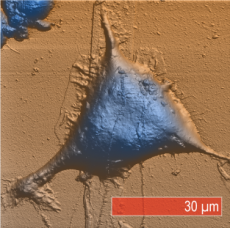Denis Bandurin is Research fellow, Massachusetts Institute of Technology (MIT, USA).
Abstract
Two-dimensional (2D) materials have recently emerged as a unique platform enabling convenient access to exotic quantum phenomena and paving the way for novel quantum devices. In particular, heterostructures made of various 2D materials offer an unprecedented setting to compose artificial crystals with properties that cannot be found in natural solids and thus to create previously inaccessible technology. In addition, stacking, twisting, and gating of such heterostructures offer tunability of their unique properties which call for their comprehensive exploration and utilization.
In the first part of my talk, we will overview the “brand-new world” of 2D quantum materials and discuss some novel interaction-driven effects in the quantum flatland. In particular, I will show that unlike the case of conventional conductors, electrons in some 2D systems, such as graphene, can behave as highly-viscous charged fluids whose behavior is governed by the laws of hydrodynamics rather than single particle kinetics [1-4]. I will argue that this novel regime of electron transport must be accounted for when constructing future electronic devices. Then we will switch to discuss novel phenomena governed by strong light-matter interaction at the nanoscale. I will show how the flow of moving Dirac electrons can alter the dispersion of light via the plasmonic Fizeau effect thereby offering an opportunity to break reciprocity at infrared photonic systems without resorting to magnetic fields or chiral optical pumping [5]. In the last part of my talk, we will discuss opportunities to advance quantum technologies using 2D materials and their heterostructures.
[1] Negative Local Resistance Caused by Viscous Electron Backflow in Graphene, D. A. Bandurin, et al., Science 351, 1055 (2016).
[2] Fluidity Onset in Graphene, D. A. Bandurin, A. Shytov, et al., Nat. Comm. 9, 4533 (2018).
[3] Superballistic Flow of Viscous Electron Fluid through Graphene Constrictions, R. Krishna Kumar, D.A Bandurin, et al., Nat. Phys. 13, 1182 (2017).
[4] Measuring Hall viscosity of Graphene’s Electron Fluid, A.I. Berdyugin et al., Science 364, 6436, 162-165 (2019).
[5] Fizeau Drag in Graphene Plasmonics, Y. Dong, L. Xiong, I.Y. Phinney, Z. Sun, R. Jing, A.S. McLeod, S. Zhang, S. Liu, H. Gao, Z. Dong, R. Pan, J. H. Edgar, P. Jarillo-Herrero, L.S. Levitov, A.J. Millis, M. M. Fogler, D.A. Bandurin, D.N. Basov, to appear on arxiv soon (2020).
Biography
Denis Bandurin graduated from Moscow State University in 2014. In 2013 he was a visiting researcher at the University of Wuppertal where he explored the physics of nanocarbon materials. In 2014 he moved to the UK where he did his Ph.D. in condensed matter physics under the supervision of Profs. A.K. Geim and I.V. Grigorieva as a member of a Marie Curie Initial Training Network program. After graduation, he continued his research in Manchester as a research associate in physics and soon after was appointed as a Leverhulme Early Career Fellow of the University of Manchester. In 2018 he received a Pappalardo Fellowship in physics from Massachusetts Institute of Technology where currently conducts his research in the field of 2D materials. The research activity of Denis Bandurin lies at the interface of quantum transport, light-matter interaction at the nanoscale, and material research.
RQC is inviting you to a scheduled Zoom meeting.
Join Zoom Meeting
ttps://us02web.zoom.us/j/86570890171?pwd=ZDl0WDdrOGQzd3N1cHdhVUZBSkh2Zz09
Meeting ID: 865 7089 0171
Password: 752764

